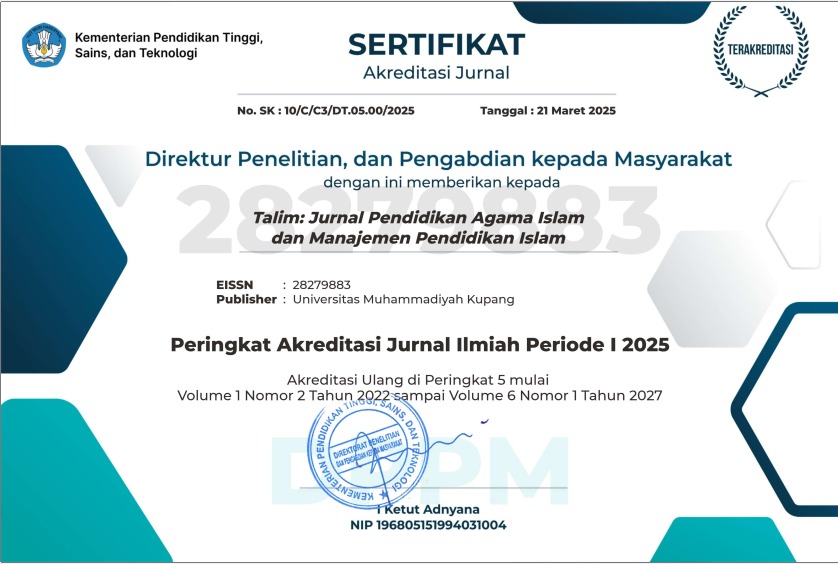CHATGPT DAN PENELITIAN AKADEMIK: TINJAUAN DAN REKOMENDASI BERDASARKAN CONTOH PRAKTIS
Abstract
Dalam dunia akademis, para akademisi, peneliti, dan mahasiswa telah menggunakan Large Language Models (LLM) seperti ChatGPT untuk menyelesaikan berbagai tugas akademis dan non-akademis mereka, termasuk menulis esai, menulis pidato formal dan informal, meringkas literatur, dan menghasilkan ide. Namun, penggunaan ChatGPT dalam penelitian akademis masih menjadi isu yang kontroversial. Baru-baru ini, dampaknya terhadap penelitian dan publikasi akademis telah diteliti. Tujuan mendasar dari penelitian ini adalah untuk menyoroti penerapan ChatGPT dalam penelitian akademis dengan menunjukkan contoh praktis dengan beberapa rekomendasi. Data untuk penelitian ini dikumpulkan dengan menggunakan artikel yang dipublikasikan, situs web, blog, dan artefak visual dan numerik. Kami telah menganalisis, mensintesis, dan mendeskripsikan data yang kami kumpulkan dengan menggunakan tinjauan literatur pengantar. Temuan ini mengungkapkan bahwa untuk menghasilkan ide awal untuk penelitian ilmiah akademis, ChatGPT dapat menjadi alat yang efektif. Namun, dalam hal sintesis literatur, kutipan, pernyataan masalah, kesenjangan penelitian, dan analisis data, para peneliti mungkin menghadapi beberapa tantangan. Oleh karena itu, dalam kasus-kasus ini, para peneliti harus berhati-hati dalam menggunakan ChatGPT dalam penelitian akademis. Mempertimbangkan potensi aplikasi dan konsekuensi dari ChatGPT, adalah suatu keharusan bagi komunitas akademik dan ilmiah untuk membuat pedoman yang diperlukan untuk penggunaan LLM yang tepat, terutama ChatGPT, dalam penelitian dan penerbitan.
References
Cooper, H. M. (1998). Synthesizing Research: A Guide for Literature Reviews. SAGE. (Google-BooksID: ZWvAmbjtE9sC)
Dowling, M., & Lucey, B. (2023, May). ChatGPT for (Finance) research: The Bananarama Conjecture. Finance Research Letters, 53, 103662. Retrieved 2023-03-28, from https://linkinghub.elsevier.com/retrieve/pii/S1544612323000363 doi: doi: 10.1016/j.frl.2023.103662
Dwivedi, Y. K., Kshetri, N., Hughes, L., Slade, E. L., Jeyaraj, A., Kar, A. K., . . . Wright, R. (2023, August). “So what if ChatGPT wrote it?” Multidisciplinary perspectives on opportunities, challenges and implications of generative conversational AI for research, practice and policy. International Journal of Information Management, 71, 102642. Retrieved 2023-03-28, from https://linkinghub.elsevier.com/retrieve/pii/S0268401223000233 doi: doi: 10.1016/j.ijinfomgt.2023.102642
Eagly, A. H., & Wood, W. (1994). Using research syntheses to plan future research. In H. Cooper & L. V. Hedges (Eds.), The Handbook of Research Synthesis (pp. 485–500). Russell Sage Foundation.
Else, H. (2023, January). Abstracts written by ChatGPT fool scientists. Nature, 613(7944), 423–423. Retrieved 2023-03-28, from https://www.nature.com/articles/d41586-023-00056-7 doi: doi: 10.1038/d41586-023-00056-7
Elsevier. (2023). The Use of AI and AI-assisted Technologies in Scientific Writing. Retrieved 2023-02- 20, from https://www.elsevier.com/about/policies/publishing-ethics
Gao, C. A., Howard, F. M., Markov, N. S., Dyer, E. C., Ramesh, S., Luo, Y., & Pearson, A. T. (2022, December). Comparing scientific abstracts generated by ChatGPT to original abstracts using an artificial intelligence output detector, plagiarism detector, and blinded human reviewers. bioRxiv. Retrieved 2023-03-28, from https://www.biorxiv.org/content/10.1101/2022.12.23.521610v1 doi: doi: 10.1101/2022.12.23.521610
Gordijn, B., & Have, H. t. (2023, March). ChatGPT: evolution or revolution? Medicine, Health Care and Philosophy, 26(1), 1–2. Retrieved 2023-03-28, from https://doi.org/10.1007/s11019-023-10136-0 doi: doi: 10.1007/s11019-023-10136-0
Grimaldi, G., & Ehrler, B. (2023, January). AI et al. : Machines Are About to Change Scientific Publishing Forever. ACS Energy Letters, 8(1), 878–880. Retrieved 2023-03-28, from https://pubs.acs.org/doi/10.1021/acsenergylett.2c02828 doi: doi: 10.1021/ acsenergylett.2c02828
Hutson, M. (2022, November). Could AI help you to write your next paper? Nature, 611(7934), 192–193. Retrieved 2023-03-28, from https://www.nature.com/articles/d41586-022-03479-w doi: doi: 10.1038/d41586-022-03479-w
Liebrenz, M., Schleifer, R., Buadze, A., Bhugra, D., & Smith, A. (2023, March). Generating scholarly content with ChatGPT: ethical challenges for medical publishing. The Lancet Digital Health, 5(3), e105–e106. Retrieved 2023-03-28, from https://linkinghub.elsevier.com/retrieve/pii/S2589750023000195 doi: doi: 10.1016/S2589-7500(23)00019-5
M Alshater, M. (2022). Exploring the Role of Artificial Intelligence in Enhancing Academic Performance: A Case Study of ChatGPT. SSRN Electronic Journal. Retrieved 2023-03-28, from https://www.ssrn.com/abstract=4312358 doi: doi: 10.2139/ssrn.4312358
Muslimin, I. (2024). The Use of ChatGPT to Improve Scientific Article Productivity of Postgraduate Students. Journal of Educational Management and Instruction (JEMIN), 3(1), 63–71. https://doi.org/10.22515/jemin.v3i1.7352
McMaster LibGuides at McMaster University. (n.d.). Retrieved 2023-03-15, from https://libguides.mcmaster.ca/guidetoresources
O’Connor, S., & ChatGPT. (2023, January). Open artificial intelligence platforms in nursing education: Tools for academic progress or abuse? Nurse Education in Practice, 66, 103537. Retrieved 2023-03-28, from https://linkinghub.elsevier.com/retrieve/pii/S1471595322002517 doi: doi: 10.1016/j.nepr.2022.103537
Rahaman, M. S., Ahsan, M. M. T., Anjum, N., Rahman, M. M., & Rahman, M. N. (2023). The AI Race is on! Google’s Bard and Openai’s Chatgpt Head to Head: An Opinion Article. SSRN Electronic Journal. Retrieved 2023-03-28, from https://www.ssrn.com/abstract=4351785 doi: doi: 10.2139/ssrn.4351785
Sankaran V. (2023, January). Scientific journals ban ChatGPT use by researchers to write studies. Retrieved 2023-03-28, from https://www.independent.co.uk/tech/chatgpt-ai-journals-ban-author-b2270334.html
Spring Nature. (2023, January). Tools such as ChatGPT threaten transparent science; here are our ground rules for their use. Nature, 613(7945), 612–612. Retrieved 2023-03-28, from https://www.nature.com/articles/d41586-023-00191-1 doi: doi: 10.1038/ d41586-023-00191-1
Stokel-Walker, C. (2023, January). ChatGPT listed as author on research papers: many scientists disapprove. Nature, 613(7945), 620–621. doi: doi: 10.1038/d41586-023-00107-z
Taylor & Francis. (2023, February). Taylor & Francis Clarifies the Responsible use of AI Tools in Academic Content Creation. Retrieved 2023-03-28, from https://newsroom.taylorandfrancisgroup.com/taylor-francis-clarifies-the -responsible-use-of-ai-tools-in-academic-content-creation/
Transformer, C. G. P.-t., & Zhavoronkov, A. (2022, December). Rapamycin in the context of Pascal’s Wager: generative pre-trained transformer perspective. Oncoscience, 9, 82–84. Retrieved 2023-03-14, from https://www.oncoscience.us/lookup/doi/10.18632/oncoscience.571 doi: doi: 10.18632/oncoscience.571
Van Dis, E. A. M., Bollen, J., Zuidema, W., Van Rooij, R., & Bockting, C. L. (2023, February). ChatGPT: five priorities for research. Nature, 614(7947), 224–226. Retrieved 2023-03-28, from https://www.nature.com/articles/d41586-023-00288-7 doi: doi: 10.1038/ d41586-023-00288-7
Ventresca, M. J., & Mohr, J. W. (2017, October). Archival Research Methods. In J. A. C. Baum (Ed.), The Blackwell Companion to Organizations (pp. 805–828). Oxford, UK: Blackwell Publishing Ltd. Retrieved 2023-03-28, from https://onlinelibrary.wiley.com/doi/10.1002/9781405164061.ch35 doi: doi: 10.1002/9781405164061.ch35
Vogt, P. W., Gardner, D. C., & Haeffele, L. M. (2012). When to Use What Research Design. Guilford Press. Retrieved from https://books.google.com.bd/books?hl=en&lr=&id=iDELMeGcIgAC&oi=fnd&pg=PP2&dq=Vogt,+W.+P.,+Gardner,+D.+C.,++Haeffele,+L.+M.+When+to+use+what+research+design.+%09Guilford+Press,+2012.+&ots=7_GOVKvlay&sig=M-mbGj_MFZoaBcJ9R1M9FeSwm14&redir_esc=y#v=onepage&q&f=false (Google-Books-ID: iDELMeGcIgAC)
Copyright (c) 2025 Ikhwanul Muslimin

This work is licensed under a Creative Commons Attribution 4.0 International License.









